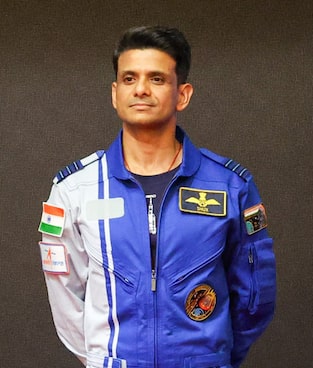In a proud moment for the nation, Group Captain Shubhanshu Shukla became only the second Indian to travel to space, as he lifted off today aboard the Axiom-4 (Ax-4) mission. The launch, which took place from the Kennedy Space Center in Florida at 12:01 pm IST, marks India’s return to human spaceflight after more than four decades, following the legendary journey of Rakesh Sharma in 1984.
Mission Details and Orbit
The Ax-4 mission is a landmark international collaboration, with astronauts from India, Poland, and Hungary joining veteran former NASA astronaut Peggy Whitson, who commands the mission. This mission is especially significant because it is the first government-sponsored human spaceflight in over four decades for all three nations, and the first time their astronauts are visiting the ISS.
The mission launched successfully from Launch Complex 39A at NASA’s Kennedy Space Center in Florida at 2:31 a.m. ET (12 noon IST) on June 25, 2025, aboard a SpaceX Dragon spacecraft. The crew is expected to dock with the ISS’s Harmony module around 7 a.m. ET (4 p.m. IST) on June 26, 2025, after a journey of several hours in orbit.
Once aboard the ISS, the astronauts will spend approximately two weeks in low Earth orbit, which is about 400 kilometres above the Earth’s surface. Their primary focus will be on scientific research, educational outreach, and technology demonstrations in the unique microgravity environment of the ISS. The mission includes more than 60 scientific experiments and outreach activities, representing the interests of 31 countries, including India, Poland, Hungary, and the United States among others.
India’s contribution, coordinated by ISRO in collaboration with NASA and ESA, focuses on microgravity research. Key Indian experiments include studies on crop and seed growth, digital behaviour in space, microbial life (such as cyanobacteria and microalgae), muscle health, and the resilience of tardigrades—tiny organisms known for surviving extreme conditions. These experiments aim to advance knowledge about how living systems behave in space and develop new technologies for future long-duration missions.
Poland’s research will focus on neurofeedback, gut microbiome changes, and wearable health technology, while Hungary will investigate cognition, motor skills, and the resilience of fruit flies in space. All these studies are designed to improve human health, sustainability, and technology for future planetary missions and the development of commercial space stations.
Shubhanshu Shukla’s Journey
Group Captain Shubhanshu Shukla’s story is one of dedication and national pride. Born in Lucknow, Uttar Pradesh, on 10 October 1985, Shukla completed his military training at the National Defence Academy and holds a Bachelor of Science degree in Computer Science. Commissioned into the Indian Air Force in 2006, he has logged over 2,000 flying hours on various aircraft, including the Su-30 MKI and MiG-29, earning a reputation as a skilled combat leader and test pilot.
Shukla was selected last year as one of four Indian Air Force officers for the nation’s upcoming Gaganyaan human spaceflight programme. His participation in the Ax-4 mission is seen as a crucial step, providing hands-on experience in spaceflight operations, microgravity adaptation, and emergency preparedness—skills that will be vital for India’s own crewed missions in the near future.
His journey to the launchpad was not without challenges. The Ax-4 mission faced multiple delays due to technical issues, including a liquid oxygen leak in the Falcon 9 rocket and air leaks on the ISS, but these were resolved by engineers before the successful lift-off. Shukla and his fellow crew members underwent weeks of quarantine in Florida to ensure their health and safety ahead of the mission.
What the Mission Means for India
The excitement surrounding Shukla’s flight is palpable across the country. His parents, teachers, and the people of Lucknow are celebrating with pride, seeing his achievement as a symbol of India’s growing stature in the global space community. The experience gained from this mission is expected to directly benefit India’s ambitious plans, including the Gaganyaan mission set for 2027, a national space station by 2035, and the aim to land an Indian on the Moon by 2040.
As Shukla himself said before launch, “As I embark on this journey into space, I carry not only instruments and gear but also the hopes and dreams of a billion hearts. I urge all Indians to pray for our mission’s success”.


